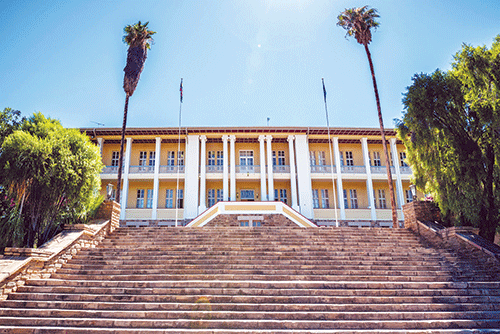As the curtain draws close on 2023 with only a week left until we welcome 2024, it’s time to reflect on the dynamic and eventful year that unfolded within the halls of the Namibian Parliament.
The year was marked by a series of legislative milestones, political debates and societal challenges which tested the resilience and adaptability of Namibia’s parliamentary system.
Same-sex marriages
One of the standout moments in the parliamentary calendar was the swift passage of Swapo member of parliament Jerry Ekandjo’s private member’s bill in both the National Assembly and National Council, aimed at outlawing the recognition of same-sex marriage.
A majority of lawmakers rallied behind the Bill.
Maudjuu, as Ekandjo is affectionately known, introduced it with the aim of amending the Marriages Act of 1961 to outlaw same-sex marriage in Namibia. He wants the Bill to provide a precise definition of the term ‘spouse’, in tandem with Namibia’s definition of marriage.
The Bill is currently in the hands of the head of state to either accept or reject.
This matter was again topped by a Cabinet decision to introduce a new marriage bill that requires people desiring to wed to submit marriage applications, which will be featured in newspapers for public scrutiny.
The proposed law was sponsored by the former deputy minister of home affairs Daniel Kashikola, and could also have been a slap in the face for same-sex marriages as it does not recognise such unions at all.
Soon after, Kashikola was shuffled out by President Hage Geingob in September, and replaced by Lucia Witbooi.
Parliamentary standing committee
In the middle of this year, the parliamentary standing committee on gender equality, social development and family affairs visited various regions around the country. There, it found that most hospitals and satellite clinics are facing a plethora of problems, including a shortage of bed linen and space in maternity wards, while some do not have sufficient refrigeration to store critical medicine.
Million dollars each
Another highlight that sparked public outrage is the motion that was tabled by Swapo MP Eliphas Dingara, calling for a million Namibia dollars to be allocated to each Namibian.
He said in his motivation that Namibia is rich enough in natural resources for the state to afford to take care of its population.
At a later stage, Dingara withdrew his motion, saying it needed to be well-thought-through.
Housing crisis
The year also witnessed a renewed focus on addressing the housing crisis in the country, with parliamentarians actively engaging in discussions around housing crisis mitigations.
The Popular Democratic Movement (PDM) held a land conference to unpack some of the housing challenges, while the Landless People’s Movement (LPM)’s MP Utaara Mootu drew attention to the critical issues of housing shortages and funding gaps in Namibia.
Paternity leave
Additionally, Prime Minister Saara Kuugongelwa-Amadhila last month said the government would consider a motion supporting the introduction of paternity leave.
This is after PDM member Winnie Moongo called for five months’ maternity leave with full pay, and the introduction of paternity leave to Namibia’s legal framework.
– ashikololo@nepc.com.na



